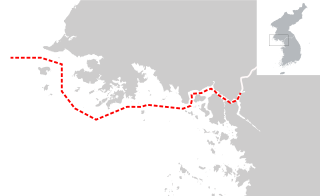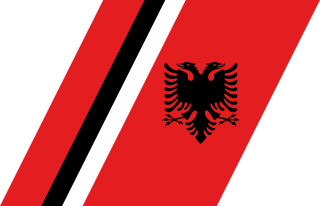
A coast guard or coastguard is a maritime security organization of a particular country. The term embraces wide range of responsibilities in different countries, from being a heavily armed military force with customs and security duties to being a volunteer organization tasked with search and rescue without law enforcement authority. In most countries, a typical coast guard's functions are distinct from those of the navy and the transit police, while in certain countries they have similarities to both.

The Indian Coast Guard (ICG) is a maritime law enforcement and search and rescue agency of India with jurisdiction over its territorial waters including its contiguous zone and exclusive economic zone. It was formally established on 1 February 1977 by the Coast Guard Act, 1978 of the Parliament of India. It operates under the Ministry of Defence.

The Coast Guard Administration of the Ocean Affairs Council, also known as the Taiwan Coast Guard or R.O.C. Coast Guard, is charged with maintaining law and order, protecting the resources of the territorial waters of the Republic of China (Taiwan), which surrounds Taiwan, Penghu, Kinmen, Matsu Islands, Green Island, Orchid Island, Pratas Island (Tungsha/Dongsha), and Nansha Islands as well as providing a first line of defense along coastal areas against smugglers and illegal immigrants. The CGA is considered a civilian law enforcement agency under the administration of the Ocean Affairs Council of the Executive Yuan, though during emergencies it may be incorporated as part of the Republic of China Armed Forces.
The Force d'action navale is the 9,600-man and about 100-ship force of surface warships of the French Navy. As of 2018, it is commanded by Vice-Amiral d’Escadre Jean-Philippe Rolland.

The Northern Limit Line or North Limit Line (NLL) – 북방한계선 – is a disputed maritime demarcation line in the Yellow (West) Sea between the Democratic People's Republic of Korea (DPRK) in the north, and the Republic of Korea (ROK) in the south. This line of military control acts as the de facto maritime boundary between North and South Korea.

A border guard of a country is a national security agency that performs border security. Some of the national border guard agencies also perform coast guard and rescue service duties.

The Malaysian Maritime Enforcement Agency ; formally known as Malaysia Coast Guard for international identification, is the coast guard organisation of Malaysia, and principal government agency tasked with maintaining law and order, and coordinating search and rescue operations in the Malaysian Maritime Zone and on the high seas.
Operation Active Endeavour was a maritime operation of the North Atlantic Treaty Organization. It operated in the Mediterranean Sea and was designed to prevent the movement of terrorists or weapons of mass destruction. It had collateral benefits in enhanced security of shipping in general. It was one of the first military actions taken by NATO in response to an invocation of Article 5 of the North Atlantic Treaty which provides for collective defense and the first-ever operation conducted by the Alliance in direct application of the defense clause of the Treaty. In November 2016 it was replaced by the non-Article-5 Operation Sea Guardian.
The United States Coast Guard is the coastal defense, search and rescue, and maritime law enforcement branch of the United States Armed Forces and is one of the country's eight uniformed services. It carries out three basic roles, which are further subdivided into eleven statutory missions. The three roles are:

Vietnam Coast Guard is the coast guard of Vietnam. VCG is purposed to perform search and rescue duties, along with their duties of combating and preventing smuggling, piracy, and trade fraud in Vietnamese waters.
Monitoring, control and surveillance (MCS), in the context of fisheries, is defined by the Food and Agriculture Organization (FAO) of the United Nations as a broadening of traditional enforcing national rules over fishing, to the support of the broader problem of fisheries management.

Vessel Monitoring Systems (VMS) is a general term to describe systems that are used in commercial fishing to allow environmental and fisheries regulatory organizations to track and monitor the activities of fishing vessels. They are a key part of monitoring control and surveillance (MCS) programs at national and international levels. VMS may be used to monitor vessels in the territorial waters of a country or a subdivision of a country, or in the Exclusive Economic Zones (EEZ) that extend 200 nautical miles (370.4 km) from the coasts of many countries. VMS systems are used to improve the management and sustainability of the marine environment, through ensuring proper fishing practices and the prevention of illegal fishing, and thus protect and enhance the livelihoods of fishermen.

India–Pakistan maritime trespassing refers to the frequent trespassing and violation of respective national territorial waters of India and Pakistan in peacetime. Most trespassing is common to Pakistani and Indian fishermen operating along the coastline of the Indian state of Gujarat and the Pakistani province of Sindh. Recently the Indian Coast Guard apprehended a Pakistani fishing boat along the Gujarat coast and arrested 14 fishermen of the neighbouring nation. Most violations occur due to the absence of a physical boundary and lack of navigational tools for small fishermen. Hundreds of fishermen are arrested by the Coast Guards of both nations, but obtaining their release is difficult and long-winded owing to the hostile relations between the two nations.

The Bangladesh Coast Guard is the maritime law enforcement force of Bangladesh. It is a paramilitary force which is under the jurisdiction of the Ministry of Home Affairs. Its officers and sailors are transferred from Bangladesh Navy, and most of the medical officers are transferred from Bangladesh Army. The Bangladesh Coast Guard also performs the duty of maritime border security of Bangladesh. The headquarters is located in Dhaka, Bangladesh. Currently the coast guard has 3,339 personnel and 63 ships. A modernisation plan named Coast Guard Goal 2030 has been undertaken to enhance its capabilities.

The Sri Lanka Coast Guard (SLCG) is a Sri Lankan non-ministerial government department tasked with coast guard duties within the territorial waters of Sri Lanka. It comes under the purview of the Ministry of Defence and its members are all naval personnel. The current Director General of the SLCG is Rear Admiral Pujitha Vithana
China used to operate several separate maritime law enforcement agencies. These services operated ships as well as their own small aviation units to assist their maritime patrol capabilities. In July 2013, the functions of these services were taken over by the unified China Coast Guard.

The Pakistan Maritime Security Agency is a branch of the Pakistan Navy. It is a Navy-managed and Navy-controlled law enforcement agency whose mission is to provide protection to the Pakistan's maritime interests and enforcement of maritime law with jurisdiction over the domestic and international waters of Pakistan including the exclusive economic zone. Pakistan Maritime security agency should not be confused with Pakistan Coast Guards which is security force under Pakistan Army.
The United Arab Emirates Coast Guard is the official coast guard agency of the United Arab Emirates and is primarily responsible for the protection of the UAE's coastline through regulation of maritime laws, maintenance of seamarks, border control, anti-smuggling operations and other services. The UAE Coast Guard is an affiliated branch of the United Arab Emirates Armed Forces and works in close coordination with the United Arab Emirates Navy.

The Albanian Coast Guard is the maritime law enforcement force of Albania. It is a paramilitary force which is under the authority of the Ministry of Defence and its operational duties in peacetime are organized and commanded by the Inter-Institutional Operational Maritime Center (QNOD). The Coast Guard has the responsibility for the security of Albanian territorial waters, maritime surveillance and law enforcement, as well as search and rescue. In operational combat situations in peacetime or wartime, the direction and command of the Albanian Coast Guard passes to military authorities and Albanian Naval Force.

The Myanmar Coast Guard is a maritime law enforcement agency formed to safeguard Myanmar's ocean-based blue economy including marine tourism, maritime trade, deep seaport services, offshore oil and natural gas production and marine fishing, to prevent illegal trespassing in the seas, and to maintain the rule of law at sea. The Myanmar Coast Guard has a constabulary role in the protection of maritime interests, provides search and rescue for victims in the sea, and works toward sea environmental conservation, monitoring a wide range of activities underwater and above water in Myanmar's water territory.














